- Home
- Gustave Aimard
The Freebooters: A Story of the Texan War Page 16
The Freebooters: A Story of the Texan War Read online
Page 16
CHAPTER XVI.
THE CONSPIRATORS.
More fortunate than dramatic authors, the romancers, being bound by norules of time and place, can, at their pleasure, transport their actionand characters from one country to another, and then return to theirstarting point, not having any account to give of the time that haselapsed, or of the space they have traversed. Employing in our turn thisprivilege, we will momentarily quit the Indian border, on the skirt ofwhich our story has hitherto passed, and crossing at a leap over abouttwo hundred miles, beg the reader to follow us to Galveston, in thecentre of Texas, four months after the events we chronicled in our lastchapter.
At the period when our story is laid, that city, in which GeneralLallemand wished to found the _Champ d'Asyle_--that sublime Utopia of anoble and broken heart--was far from that commercial prosperity whichthe progress of civilization, successive immigrations, and, most of all,the speculations of bold capitalists, have caused it to attain duringthe last few years. We shall therefore describe it such as it was duringour stay in America, leaving out of sight the enormous transformationsit has since undergone.
Galveston is built on the small sandy islet of St. Louis, which almostcloses up the mouth of the Rio Trinidad. At that time the houses werelow, mostly built of wood, and surrounded by gardens planted withfragrant trees, which impregnated the atmosphere with delicious odours.
Unfortunately there is one thing that cannot alter--the climate and thenature of the soil. The suffocating heat that almost continuallyprevails in the town corrodes the earth and changes it into animpalpable dust, in which you sink up to the knees, and which, at theleast breath of air, penetrates into the eyes, mouth, and nostrils;myriads of mosquitoes, whose stings are extremely painful; and, aboveall, the bad quality of the water, which the inhabitants collect withgreat difficulty in plank reservoirs during the rainy season, and whichthe sun renders boiling--these grievous occurrences, especially forEuropeans, render a residence at Galveston insupportable, and even mostdangerous.
The Texans themselves so greatly fear the deadly influence of thisclimate that, during the torrid heat of summer, rich persons emigrate byhundreds to the mainland, so that the town, which becomes almostsuddenly deserted by this momentary departure, assumes a look of saddesolation which is painful to behold.
About four in the afternoon, at the moment when the rising sea breezebegan to refresh the atmosphere, a little Indian canoe, made of beechbark, left the mainland, and vigorously impelled by two men suppliedwith wide sculls, proceeded toward the city and pulled alongside theplank quay, which served at that time as the landing place. So soon asthe canoe was stationary, a third person, carelessly reclining in thestern sheets, rose, looked round him as if to recognise the spot wherehe was; then, taking a spring, he landed on the quay. The canoeimmediately turned round, though not a syllable had been exchangedbetween the scullers and the passenger they had brought.
The latter then pulled his hat over his eyes, wrapped himself carefullyin the folds of a wide zarap? of Indian fabric and striking colour, andproceeded hastily towards the centre of the city. After a walk of a fewminutes the stranger stopped in front of a house, whose comfortableappearance and well-tended garden showed that it belonged to a personwho, if not rich, was in easy circumstances. The door was ajar; thestranger pushed it, entered, and closed it after him; then, without anyhesitation, like a man sure of what he was about, he crossed the garden,in which he met nobody, entered the passage of the house, turned to theright, and found himself in a room modestly, though comfortablyfurnished.
On reaching this room the stranger fell into a butaca with the air of atired man delighted to rest after a long journey, took off his zarap?,which he placed on the equipal, threw his hat upon it, and then, when hehad made himself comfortable, he rolled a husk cigarette, struck a lightwith a gold mechero he took from his pocket, lit his papelito, and wassoon surrounded by a dense cloud of bluish and fragant smoke, which roseabove his head and formed a species of halo.
The stranger threw his body back, half closed his eyes, and fell intothat gentle ecstasy which the Italians call the _dolce far niente_, theTurks, _kief_, and for which we northerns, with our more powerfulconstitutions, have found no name, for the simple reason that we do notknow it.
The stranger had reached about the half of his second cigarette whenanother person entered the room. This man, who did not appear to takethe slightest notice of the previous arrival, behaved, however,precisely as he had done: he also took off his zarap?, reclined on abutaca, and lit up a cigarette. Presently the garden sand creakedbeneath the footsteps of a third visitor, followed immediately by afourth, and then by a fifth; in short, at the end of an hour twentypersons were assembled in this room. They all smoked with apparentcarelessness, and since their arrival had not exchanged a syllable.
Six o'clock struck from a clock standing on a sideboard. The last strokeof the hour had scarce ceased vibrating ere the company, as if by commonagreement, threw away their cigars, and rose with a vivacity thatcertainly was little to be expected after their previous carelessness.At the same moment a secret door opened in the wall, and a man appearedon the threshold.
This man was tall, elegant, and aristocratic, and appeared to be young.A half-mask of velvet concealed the upper part of his face; as for hisattire, it was exactly similar to that of the other persons in the room,but a brace of long pistols and a dagger were passed through the girdleof red China crape which was wound tightly round his waist. At theappearance of the stranger a quiver ran, like an electric current,through the lines of visitors. The masked man, with head erect, armscrossed on his chest, and body haughtily thrown back, gave his audiencea glance, which could be seen flashing through the holes in the velvet.
"It is well," he at length said, in a sonorous voice; "you are faithfulto your promise, Caballeros, not one of you have kept us waiting. Thisis the eighth time I have assembled you during the month, and each timeI have found you equally prompt and faithful; thanks, in the name of thecountry, Caballeros."
His auditors bowed silently, and the stranger continued, after a slightpause--
"Time presses, gentlemen; the situation is growing with each moment moreserious; today we have no longer to attempt an adventurous stroke; thehour has arrived to stake our heads resolutely in a glorious anddecisive game. Are you ready?"
"We are," they all answered unanimously.
"Reflect once more before pledging yourselves further," the Maskcontinued, in a thrilling voice: "this time I repeat to you, we shalltake the bull by the horns, and have a hand-to-hand fight with it; ofone hundred chances, ninety-eight are against us."
"No matter," the person who first entered the room said, haughtily; "iftwo chances are left us, they will be sufficient."
"I expected no less from you, John Davis," the stranger said, "you haveever been full of devotion and self-denial; but, perhaps, among ourcomrades some may not think as you do entirely. I do not regard this asa crime, for a man may love his country and yet not consent to sacrificehis life to it without regret; still, I must have perfect confidence inthose who follow me; they and I must have but one heart and one thought.Let those, then, who feel a repugnance to share in the task we have toperform tonight withdraw. I know that if prudence urges them to abstainthis time, under circumstances less desperate I should find them readyto support me."
There was a lengthened silence, and no one stirred; at length thestranger said, with an expression of joy which he did not try toconceal--
"Come, I was not mistaken; you are brave fellows."
John Davis shrugged his shoulders.
"By heaven!" he said, "The trial was useless; you ought to have knownlong ago what we are."
"Certainly I knew it, but my honour commanded me to act as I have done.Now, all is said: we shall succeed or perish together."
"Very good, that is what I call speaking," the ex-slave dealer said,with a hearty laugh; "the partisans of Santa Anna must have to holdtheir own; for, if I am not greatly mi
staken, ere long we shall cut theminto stirrup leathers."
At this moment a shrill whistle, although rather remote, was heard: asecond whistle, still nearer, replied.
"Gentlemen," the stranger said, "we are warned of the approach of anenemy; perhaps it is only a false alarm, still the interest of the causewe defend imperiously ordains prudence. Follow John Davis, while Ireceive the troublesome fellow who is intruding on us."
"Come," said the American.
The conspirators, for they were no other, displayed some hesitation, forthey felt a repugnance to hide themselves.
"Leave me," the stranger went on, "you must."
All bowed and left the room after John Davis by the secret door, whichhad offered passage to their Chief, and which closed upon them withoutdisplaying a sign of its existence, as it was so carefully hidden in thewall. A third whistle, close by, was heard at this moment.
"Yes, yes," the Chief said, with a smile, "whoever you may be, you cancome now; if you possessed the craft of the opossum and the eyes of theeagle, I defy you to discover anything suspicious here."
He took off his mask, concealed his weapons, and lay back in a butaca.Almost immediately the doors opened, and a man appeared. It was Lanzi,the half-breed; he was dressed like the sailors of the port, withcanvas trousers drawn in round the hips, a white shirt, with a blueturned down collar, with a white edging, and a tarpaulin hat.
"Well," the Chief asked, without turning, "why did you warn us, Lanzi?"
"It is highly necessary," the other answered.
"Is it serious, then?"
"You shall judge for yourself. The governor is coming hither withseveral officers and a company of soldiers."
"General Rubio?"
"In person."
"Hang it!" the conspirator said, "Are we threatened with a domiciliaryvisit?"
"You will soon know, for I hear him."
"Very good; we shall see what they want of us. In the meanwhile takethis mask and these weapons."
"The weapons too?" the other said in surprise.
"What shall I do with them? That is not the way in which I must fightthem at this moment. Be off, here they are!"
The half-breed took the mask and pistols, pressed a spring, anddisappeared through the door. The garden gravel could now be heardcreaking under the footsteps of several persons. At length the door ofthe saloon was thrown open, and the General entered, followed by four orfive officers, who, like himself, were in full dress. The Generalstopped on the threshold, and took a piercing glance around; the Chiefhad risen, and was standing motionless in the centre of the apartment.
General Rubio was a thorough man of the world. He bowed politely, andapologized for having thus entered the house without being announced;but he found all the doors open, and no servant had come up to him.
"These excuses are useless, Caballero," the young man answered; "theMexican government has for a long time accustomed us to itsunceremonious way of behaving toward us; besides, the governor of thecity has the right, I presume, to enter any house when he thinks proper,and if he does not find the door open, to have it opened, either with amasterkey or a crowbar."
"Your remarks, Caballero," the General answered, "breathe an irritationthat must be regretted. The state of effervescence in which Texas is atthis moment would be more than sufficient to justify the unusual step Iam taking with you."
"I know not to what you are pleased to allude, Se?or General," the youngman remarked, coldly; "it is possible that Texas may be in a state ofeffervescence, and the annoyances the government have put on it wouldcompletely justify this; but as concerns myself, personally, I mightperhaps have a right to complain of seeing my house invaded by an armedforce, without any previous summons, when nothing authorizes such anarbitrary measure."
"Are you quite sure, Caballero, that I have not the right to act as I amdoing? Do you consider yourself so free from suspicion that you reallyconsider this measure arbitrary?"
"I repeat to you, Caballero," the young man continued, haughtily, "thatI do not at all understand the language you do me the honour ofaddressing to me. I am a peaceable citizen; nothing in my conduct has,as far as I know, aroused the jealous solicitude of the government; andif it pleases its agents to make me undergo ill-deserved annoyance, itis not in my power to oppose it otherwise than by protestingenergetically against the insult offered me. You have force on yourside, General, so do as you think proper; I am alone here, and shall notattempt in any way to resist the measures you may think proper to take."
"That language, Caballero, evidently comes from a man assured of hissafety."
"You are mistaken, General; it is that of a free man, unjustlyinsulted."
"It may be so, but I shall not discuss the point with you. You willpermit me, however, to remark, that for a man so justly indignant, andapparently solitary, you are very carefully guarded; for, if the housebe empty, as you state, the environs are guarded by friends of yours,who, I must allow, perform admirably the commission with which they wereintrusted, by warning you sufficiently early of unexpected visits foryou to take your precautions in consequence, and render it an easymatter to get rid in a twinkling of persons whose presence here mightcompromise you."
"Instead of speaking thus in enigmas, General, it would be better,perhaps, to have a clear explanation; then, knowing the charge broughtagainst me, I might attempt to defend myself."
"Nothing is more easy, Caballero; still, you will allow me to remarkthat we have been talking together for some time, and you have not yetoffered me a chair."
The young chieftain gave the General an ironical glance.
"Why should I employ toward you those conventional forms of politeness,General? From the moment when, without my authority, and against mywill, you introduced yourself into this house, you should haveconsidered yourself as quite at home. It is I, then, who am the strangerhere, and in that position I am no longer permitted to do the honours ofthis house."
"Caballero," the General answered, with a movement of impatience, "I amgrieved to find in you this stiffness and determination to quarrel. WhenI entered this house, my intentions with respect to you were, perhaps,not so hostile as you suppose; but, since you force me to a clear andcategorical explanation, I am prepared to satisfy you, and prove to youthat I am acquainted not only with your conduct, but with the plans youentertain and are carrying out, with a tenacity and boldness which, if Idid not take, would lead inevitably to their speedy realization."
The young man started, and a flash burst from his wild eye at thisdirect insinuation, which revealed to him the danger with which he wasmenaced; but immediately regaining his presence of mind, andextinguishing the fire of his glance, he replied, coolly--
"I am listening to you, General."
The latter turned to his officers.
"Do as I do, se?ores," he said, as he sat down; "take seats, as thiscaballero refuses to offer them to us. As this friendly conversation maybe prolonged for some time yet, it is unnecessary that you shouldfatigue yourselves by listening to it standing."
The officers bowed, and seated themselves comfortably on the butacaswith which the apartment was furnished. The General continued, after afew moments of reflection, during which the young man looked at himcarelessly, while rolling a husk cigarette:
"And in the first place, to proceed regularly, and prove to you that Iam well-informed of all that concerns you," he said, purposely laying astress on the words, "I will begin by telling you your name."
"In truth, General, you should have begun with that," the young mansaid, negligently.
"You are," the General went on, quietly, "the famous Chief whom theinsurgents and Freebooters have christened the Jaguar."
"Ah, ah!" he remarked, ironically, "So you know that, Se?or Governor?"
"And a good many more things, as you shall see."
"Go on," he said, as he threw himself back with the graceful negligenceof a friend on a visit.
"After giving a powerful organization to your rev
olt on the Indianborder by seizing the Larch-tree hacienda, and allying yourself withcertain Comanche and Apache tribes, you understood that, to succeed, youmust give up that guerilla warfare, which I confess you had carried onfor some time with considerable success." "Thanks," said the Jaguar,with an ironical bow.
"You therefore entrust the temporary command of your bands to one ofyour comrades, and yourself come into the heart of Texas, with your mostfaithful associates, in order to revolutionize the coast, and deal agreat blow by seizing a seaport. Galveston, by its position at the mouthof the Trinidad river, is a strategical point of the utmost importancefor your plans. For two months past you have been concealed in thishouse, which you have made the headquarters of your insurrection, andwhere you are making all the preparations for the audacious enterpriseyou wish to attempt. You have at your disposal numerous emissaries andfaithful conspirators; the government of the United States supply youwith abundance of arms and ammunition, which you think you will soonhave need of. Your measures have been so well taken, and yourmachinations carried on with such great skill; you fancy yourself sonearly on the point of success, that hardly an hour back you convenedhere the principal members of your party, in order to give them theirfinal instructions. Is it so? Am I correctly informed? Answer me,Caballero."
"What would you have me answer, Caballero," the young man said, with adelightful smile, "since you know all?"
"Then, you confess that you are the Jaguar, the Chief of theFreebooters!"
"Canarios, I should think so."
"You also allow that you came here with the intention of seizing thecity?"
"Incontestably," the other said, with an air of mockery; "it does notallow the shadow of a doubt."
"Take care," the General remarked drily; "it is a much more seriousmatter than you seem to think."
"What the deuce would you have me do General? It is not my fault. Youenter my house, without giving me notice, with a crowd of officers andsoldiers; you surround my residence, carry it by storm, and when youhave finished this pretty job worthy of an alguazil, without showing methe slightest scrap of paper authorising you to act in that way, youtell me to my face that I am the Chief of the bandits, a conspirator,and Lord knows what; and then you request me to prove it. On my faith!Any other in my place would act as I am doing; like me, he would bow tothe weight of so great a military force and such an entire conviction.All this seems to me so extraordinary and novel, that I am beginning todoubt my own identity, and I ask myself if I have not been hithertodeceived in believing myself, Martin Gutierrez, the ranchero of SantaAldegonida, in the State of Sonora, and if I am not, on the contrary,the ferocious Jaguar, of whom you speak to me, and for whom you do methe honour of taking me. I confess to you, General, that all thisperplexes me in the highest degree, and I should feel greatly obliged ifyou would kindly bring me to some settled conviction."
"Then, Caballero, up to the present you have been jesting!" the Generalsaid hastily.
The Jaguar began laughing.
"_Cuerpo de Cristo_," he replied. "I should think so. What else could Ido in the face of such accusations? Discuss them with you? You know aswell as I do, General, that it is useless to attempt to overthrow aconviction. Instead of telling me that I am the Jaguar, prove it to me,and then I will bow to the truth. That is very simple, it appears tome."
"Very simple, indeed, Caballero; I hope to be able soon to give you thatcertainty."
"Very good; but till then, I would observe that you entered my house ina way contrary to law, that the domicile of a citizen is inviolable, andthat what you have done today, only a juez de letras, armed with a legalwarrant, was empowered to do."
"You would possibly be correct, Caballero, if we lived in ordinarytimes; but at this moment such is no longer the case; the State is in astate of siege, the military power has taken the place of the civilauthority, and alone has the right to command and have carried out thosemeasures that relate to the maintenance of order."
The young man, while the General was speaking, had taken a side glanceat the clock. When the governor ceased he rose, and bowingceremoniously, said:
"To be brief, be kind enough, then, to explain to me categorically, andwithout further circumlocution, the motives for your presence in myhouse; we have been talking a long time and I have not yet been able toread your intentions. I should, therefore, feel obliged by your makingthem known to me without delay, as important business claims my presenceabroad; and if you insist on staying here, I shall be compelled to leaveyou to yourselves."
"Oh, oh! You change your tone, I fancy, Caballero," the General said,with a little irony. "I will tell you the motives you desire to learn;as for your leaving the house without me or my sanction, which is thesame thing, I fancy you would find it rather difficult."
"Which means, I presume, that you look upon me as a prisoner, General?"
"Nearly so, Caballero. When your house has been carefully searched, andwe are convinced there is nothing suspicious in it, I may, perhaps,permit you to be put aboard a ship which will carry you far away fromthe territory of the Mexican Confederation."
"What! Without a warrant, by your mere will?"
"By my mere will: yes, Caballero."
"_Canarios_, Se?or General, I see that your government has preserved thehealthy Spanish traditions, and is deliciously arbitrary," the Jaguarsaid, mockingly; "the only question is whether I shall voluntarilysubmit to such treatment."
"You must have already perceived that force is not on your side, atleast for the present."
"Oh, General, when a man has right on his side, force can soon befound."
"Try it, then, Caballero; but I warn you that it will be at your ownrisk and peril."
"Then you will employ force to coerce a single, unarmed man in his ownhouse?"
"That is my intention."
"Oh! If that be so, I thank you, for you leave me free to act."
"What do you mean by that remark, Caballero?" the General asked, with afrown.
"What do you mean by yours, Se?or Governor? I consider that all meansare good to escape an arbitrary arrest, and that I shall employ themwithout the slightest hesitation."
"Try it," the officer said, ironically,
"When the moment for action arrives, I shall not wait for yourpermission to do so, General," the Jaguar replied, with equal sarcasm.
Although this was the first time General Rubio and the Jaguar had met,the Governor of Galveston had long been acquainted with the reputationof the man with whom he had to deal; he knew how fertile in resourceshis mind was, and the audacious temerity that formed the basis of hischaracter; personally he owed him a grudge for carrying off the conductade plata, and capturing the Larch-tree, hence he entertained a livelydesire to take an exemplary revenge on his bold adventurer.
The tone in which the Jaguar uttered the last words caused the General amoment's anxiety; but after taking a glance round him, he was reassured.In fact, owing to the precautions taken by the old soldier, it seemedmaterially impossible that his prisoner could escape, for he was alone,unarmed, in a house surrounded by soldiers, and watched by severalresolute officers; he, therefore, regarded his answer as bravado, andtook no further notice of it.
"I absolve you beforehand," he said disdainfully, "for any efforts youmay make to escape."
"I thank you, General," the Jaguar answered, with a ceremonious bow. "Iexpected nothing else from your courtesy; I make a note of yourpromise."
"Be it so. Now, with your permission we are about to commence ourdomiciliary visit."
"Do so, General, pray do so; if you desire it, I will myself act as yourguide."
"In my turn I thank you for this obliging offer, but I do not wish toput your kindness to a trial; the more so, as I am thoroughly acquaintedwith this house."
"Do you think so, General?"
"Judge for yourself."
The Jaguar bowed without replying, and carelessly leant his elbow on thecouch upon which the clock stood.
"We will f
irst begin with this saloon," the General continued.
"You mean that you will finish with it," the young man remarked, with anironical smile.
"Let us look first at the secret door in that wall."
"What! You know it then?"
"It seems so."
"Hang it all! You are better informed than I supposed."
"You do not know all yet."
"I hope so; judging from the commencement, I expect some extraordinarydiscoveries."
"Perhaps so. Will you make the spring work yourself, Caballero, or wouldyou prefer my doing it?"
"On my word, General, I confess that all this interests me so hugelythat, until fresh orders, I desire to remain a simple spectator, inorder not to trouble my pleasure."
This continued irony produced an involuntary impression on the General;the calm and coldly mocking attitude of the young man troubled him inhis heart; he feared a snare, without knowing when or how it wouldreveal itself.
"Pay attention, Caballero," he said in a menacing tone to the Jaguar; "Iknow for a fact that when I arrived you had a large party assembledhere; on my entrance, your comrades fled by that door."
"That is true," the young man said with a nod of assent.
"Take care," the General continued, "that if assassins are hidden behindthat door, the blood shed will fall on your head."
"General," the Jaguar said seriously, "press the spring, the passage isempty; I require no aid but my own to deliver myself from your clutcheswhen I think proper."
The Governor no longer hesitated; he walked resolutely to the wall, andpressed the spring; his officers had followed him, ready to aid him ifany danger presented itself. The Jaguar did not stir. The door opened,and displayed a long and completely deserted corridor.
"Well, General, have I kept my word?" the Jaguar said.
"Yes, Se?or, I must concede it. Now, Caballeros," the General continued,addressing his officers, "draw swords, and forward!"
"One moment, if you please," said the Jaguar.
"What do you want, Se?or?"
"You will remember that I warned you you would end your domiciliaryvisit with this room?"
"Well?"
"I will keep that second promise as I did the first."
At the same instant, and ere the General and his officers could accountfor what was happening, they felt the flooring give way beneath theirfeet, and they rolled to the bottom of a vault, of slight depth, it istrue, but buried in the most intense gloom.
"A pleasant journey!" the Jaguar said with a laugh, as he closed thetrap again.

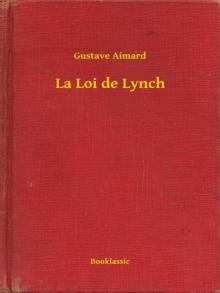 La loi de lynch. English
La loi de lynch. English The Guide of the Desert
The Guide of the Desert The Trail-Hunter: A Tale of the Far West
The Trail-Hunter: A Tale of the Far West The Pirates of the Prairies: Adventures in the American Desert
The Pirates of the Prairies: Adventures in the American Desert The Treasure of Pearls: A Romance of Adventures in California
The Treasure of Pearls: A Romance of Adventures in California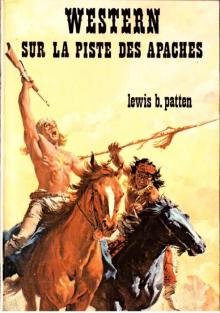 Les outlaws du Missouri. English
Les outlaws du Missouri. English Les trappeurs de l'Arkansas. English
Les trappeurs de l'Arkansas. English The Border Rifles: A Tale of the Texan War
The Border Rifles: A Tale of the Texan War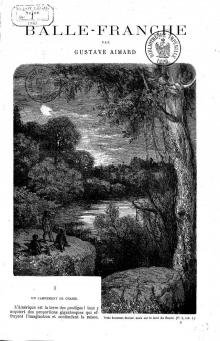 Balle-Franche. English
Balle-Franche. English The Queen of the Savannah: A Story of the Mexican War
The Queen of the Savannah: A Story of the Mexican War The Red Track: A Story of Social Life in Mexico
The Red Track: A Story of Social Life in Mexico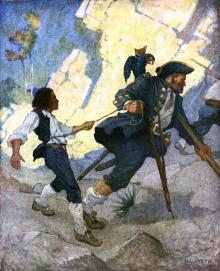 La fièvre d'or. English
La fièvre d'or. English The Pearl of the Andes: A Tale of Love and Adventure
The Pearl of the Andes: A Tale of Love and Adventure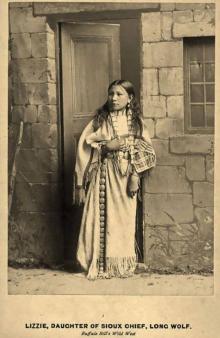 Les fils de la tortue. English
Les fils de la tortue. English The Indian Chief: The Story of a Revolution
The Indian Chief: The Story of a Revolution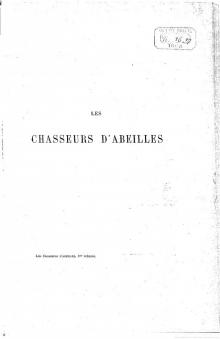 Les chasseurs d'abeilles. English
Les chasseurs d'abeilles. English The Adventurers
The Adventurers